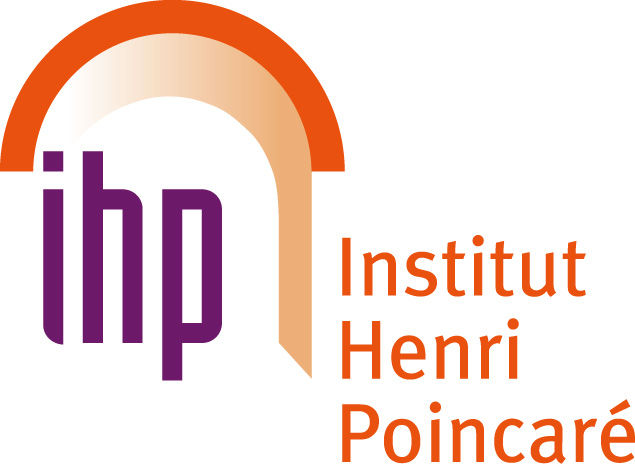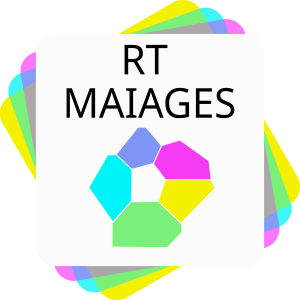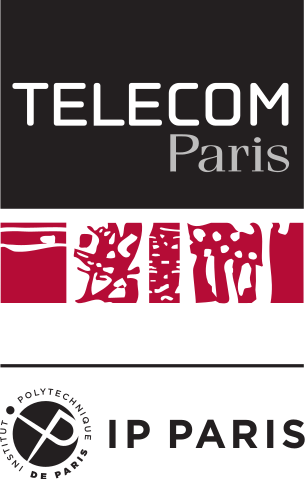Welcome to the website of the Parisian Seminar on the Mathematics of Imaging !
The goal of this seminar is to cover the fields of the mathematics of imaging in a very wide sense (including for instance signal processing, image processing, computer graphics, computer vision, various applications and connections with statistics and machine learning). It is open to everyone. It takes place at Institut Henri Poincaré on the first Tuesday of each month from 2pm to 4pm. Each seminar is composed of two presentations.
You can subscribe or unsubscribe to the mailing list of the seminar and to the agenda of the seminar.
Upcoming seminars
Click on the title to read the abstract.
Nelly Pustelnik (CNRS, ENS Lyon)
Abstract:
March 10th, 2pm, Room Yvette Cauchoix (Perrin building).
Title: ⬇
Nicolas Papadakis (Institut de Mathématiques de Bordeaux)
Abstract:
March 10th, 3pm, Room Yvette Cauchoix (Perrin building).
Title: ⬇
Clément Bonet (CMAP, École Polytechnique)
Abstract:
April 7th, 2pm, Room Yvette Cauchoix (Perrin building).
Title: ⬇
Louis Hauseux (INRIA)
Abstract: This talk bridges statistical theory and practical image processing. We begin by defining clustering as the recovery of high-density level sets from a statistical distribution in the Euclidean space. We show how to solve this problem efficiently using geometric (hyper)graphs, providing a theoretical foundation for hierarchical methods like HDBSCAN through percolation theory. Finally, we view images as graphs and demonstrate how to hack the hierarchical clustering extraction by customizing loss functions. We illustrate this approach with two applications: automatic fault detection in 2D images and unsupervized instance segmentation on 3D LiDAR point clouds.
April 7th, 3pm, Room Yvette Cauchoix (Perrin building).
Title: From Statistics to Graphs: Hierarchical Clustering for Image Analysis ⬇
Alessio Spagnoletti (Université Paris Cité)
Abstract:
May 12th, 2pm, TBA.
Title: ⬇
Yuanzhi Zhu (École Polytechnique)
Abstract:
May 12th, 3pm, TBA.
Title: ⬇
TBA
Abstract:
June 9th, 2pm, TBA.
Title: ⬇
TBA
Abstract:
June 9th, 3pm, TBA.
Title: ⬇
Previous seminars of 2025-2026
The list of seminars prior to summer 2025 is available here.
Ali Joundi
(Institut de Mathématiques de Bordeaux)
Abstract: Many crucial tasks in image processing and computer vision are formulated as inverse problems. Therefore, it is of great importance to design efficient and robust algorithms to solve these problems. In this paper, we focus on generalized projected gradient descent (GPGD) algorithms where generalized projections are realized with learned neural networks as they provide state-of-the-art results for imaging inverse problems. Indeed, neural networks allow for projections onto unknown low-dimensional sets that model complex data, such as images. We call these projections deep projective priors. In generic settings, when the orthogonal projection onto a low-dimensional model set is used, it has been shown, under a restricted isometry assumption, that the corresponding orthogonal PGD converges with a linear rate, yielding near-optimal convergence (within the class of GPGD methods) in the classical case of sparse recovery. However, for deep projective priors trained with classical mean squared error losses, there is little guarantee that the hypotheses for linear convergence are satisfied. In this paper, we propose a stochastic orthogonal regularization of the training loss for deep projective priors. This regularization is motivated by our theoretical results: a sufficiently good approximation of the orthogonal projection guarantees linear stable recovery with performance close to orthogonal PGD. We show experimentally, using two different deep projective priors (based on autoencoders and on denoising networks), that our stochastic orthogonal regularization yields projections that improve convergence speed and robustness of GPGD in challenging inverse problem settings, in accordance with our theoretical findings.
February 3rd, 2pm (moved from 3pm to 2pm due to cancellation of the other talk), room Room Yvette Cauchoix (Perrin building).
Title: Stochastic Orthogonal Regularization for deep projective priors ⬇
The talk will be given in French.
Samuel Hurault
(CNRS, LIGM)
Abstract: Sampling from an unknown distribution, accessible only through discrete samples, is a fundamental problem at the core of generative AI. The current state-of-the-art methods follow a two-step process: first, estimating the score function (the gradient of a smoothed log-distribution) and then applying a diffusion-based sampling algorithm. The resulting distribution's correctness can be impacted by three major factors: the generalization and optimization errors in score matching, and the discretization error in the diffusion. In this paper we provide, in the Gaussian setting, the exact Wasserstein sampling error that arises from these four error sources. This allows us to rigorously track how the anisotropy of the data distribution (encoded by its power spectrum) interacts with key parameters of the end-to-end sampling method.
December 2nd, 2pm, room Room Yvette Cauchoix (Perrin building).
Title: From Score Matching to Diffusion: a fine-grained error analysis in the Gaussian setting ⬇
Nils Laurent
(LASPI Roanne)
Abstract: Les algorithmes de reconstruction d'images Plug-and-Play (PnP) sont fondés sur des réseaux de neurones profonds débruiteurs et utilisés comme a priori pour la résolution de problèmes inverses. Malgré leur flexibilité, les algorithmes PnP requièrent un large nombre d'itérations pour converger et leur performance est sensible au choix de l'initialisation et des hyperparamètres. Dans cette présentation, nous considérons un nouvel algorithme PnP multiniveaux qui accélère la convergence en combinant des itérations faites à différentes échelles et améliore la robustesse à l'initialisation ainsi qu'aux hyperparamètres grâce à une stratégie exploitant les échelles plus grossières pour la résolution aux échelles fines. Nous pourrons observer par une série d'expériences numériques incluant le dématriçage et l'inpainting que cette nouvelle méthode est plus rapide et donne de meilleures reconstructions que d'autres algorithmes PnP états-de-l'art.
December 2nd, 3pm, room Room Yvette Cauchoix (Perrin building).
Title: Restauration d'Images par Algorithme Plug-and-Play Multiniveaux ⬇
Kimia Nadjahi
(CNRS, ENS PARIS)
Abstract: Conformal Prediction (CP) is a principled framework for quantifying uncertainty in blackbox learning models, by constructing prediction sets with finite-sample coverage guarantees. Traditional approaches rely on scalar nonconformity scores, which fail to fully exploit the geometric structure of multivariate outputs, such as in multi-output regression or multiclass classification. Recent methods addressing this limitation impose predefined convex shapes for the prediction sets, potentially misaligning with the intrinsic data geometry. We introduce a novel CP procedure handling multivariate score functions through the lens of optimal transport. Specifically, we leverage Monge-Kantorovich vector ranks and quantiles to construct prediction regions with flexible, potentially non-convex shapes, better suited to the complex uncertainty patterns encountered in multivariate learning tasks. We prove that our approach ensures finite-sample, distribution-free coverage properties, similar to typical CP methods. We then adapt our method for multi-output regression and multiclass classification, and also propose simple adjustments to generate adaptive prediction regions with asymptotic conditional coverage guarantees. Finally, we evaluate our method on practical regression and classification problems, illustrating its advantages in terms of (conditional) coverage and efficiency. This is joint work with Gauthier Thurin (CNRS, ENS Paris) and Claire Boyer (Université Paris-Saclay).
November 4th, 2pm, room Amphi Darboux (Borel building).
Title: Optimal Transport-based Conformal Prediction ⬇
Laetitia Chapel
(Institut Agro Rennes-Angers, IRISA)
Abstract: Optimal Transport (OT) has emerged as a fundamental tool in modern machine learning, mainly due to its ability to provide meaningful comparisons between probability distributions. One of the key strengths of OT is its dual nature: it not only introduces a mathematically rigorous framework defining Wasserstein distances but also constructs an optimal coupling (or transport plan) between distributions. This coupling reveals explicit correspondences between samples, enabling a broad spectrum of applications. Despite the numerous successes of optimal transport in machine learning and the availability of many tools to approximate Wasserstein distances, computing OT plans remains computationally challenging. In this talk, I will present a new methodology to efficiently approximate sliced OT plans. The formulation can be recast as a bilevel optimization problem, and I will propose a differentiable generalized approximation that can be further adapted to data residing on manifolds. Finally, I will demonstrate the practical value of this approach by introducing a novel sliced OT-based conditional flow matching method for image generation, an application where fast computation of transport plans is crucial.
November 4th, 3pm, room Amphi Darboux (Borel building).
Title: Sliced optimal transport plans with an application to conditional flow matching ⬇
Raphaël Achddou
(ESIEE Paris, LIGM)
Abstract: Neural Networks have surpassed traditional prior-based approaches in solving inverse problems, but their black-box nature hinders their interpretability and confidence. To address these issues, a potential approach is to synthesize training images with controlled statistical properties. In this talk, I’ll present how a simple occlusion-based image model called the Dead Leaves model can be used to generate high-quality training data for various image restoration tasks. I’ll then show how this model can be adapted to incorporate essential image properties like texture, depth, and complex object geometry. The resulting trained restoration models perform similarly to those trained on real images while offering additional benefits, such as insightful ablation studies, inherent invariance properties, and faster convergence, which I’ll discuss further.
October 7th, 2pm, room Room Pierre Grisvard (Borel building).
Title: Synthetic training of deep image restoration networks : principles and applications ⬇
Organizers
- Samy Blusseau (CMM @ Mines Paris - PSL)
- Vincent Duval (INRIA & CEREMADE @ Université Paris Dauphine - PSL)
- Arthur Leclaire (LTCI @ Télécom Paris)
- Alasdair Newson (ISIR @ Sorbonne Université)
- Pauline Tan (LJLL @ Sorbonne Université)
- Jonathan Vacher (MAP5 @ Université Paris Cité)
Thanks
The seminar is hosted by IHP, and supported by RT-MAIAGES, Télécom Paris and CMM Mines Paris - PSL.



